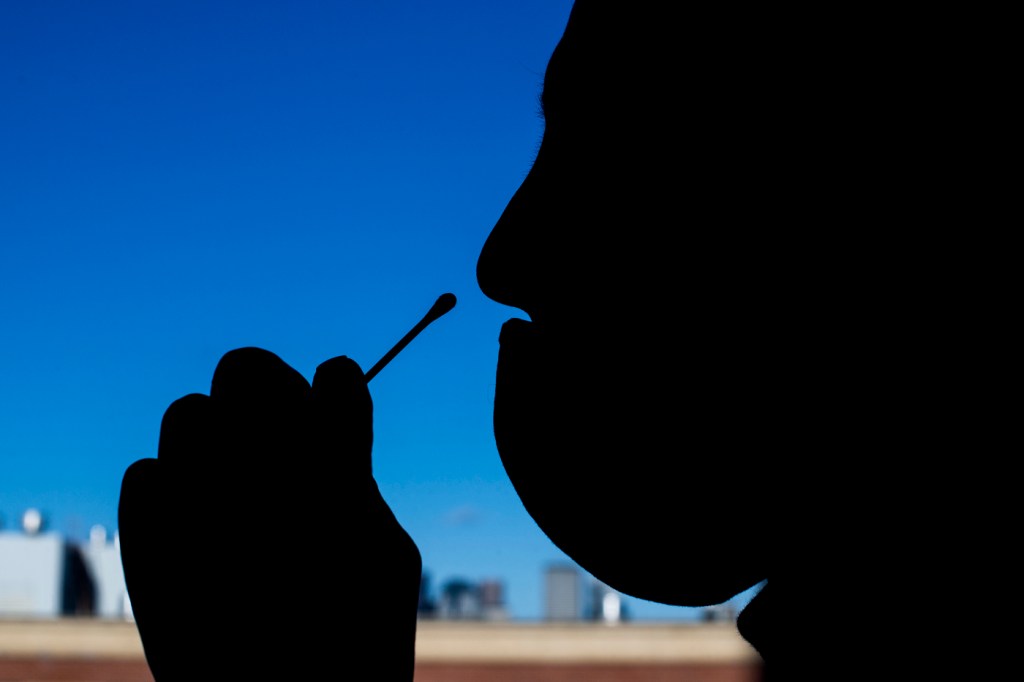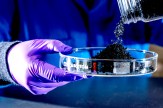At Northeastern, a chance to advance COVID-19 research like never before

Since late August, the university has run more than 450,000 COVID-19 tests of students, faculty, staff, and contract employees. The vast majority of the samples collected on the Boston campus are processed in Northeastern’s own Life Sciences Testing Center, a state-of-the-art laboratory with state and federal certification on the university’s Burlington, Massachusetts campus.
Those waiting in line at the Cabot Testing Center may have spotted signs throughout the building with QR codes promoting the Testing Research Registry and Repository. The repository has been created by the university to collect COVID-19 test results and biomedical specimens donated by those getting tested.
“Our testing protocol presents an opportunity to advance the science of pandemic research,” said David Luzzi, senior vice president for research and head of Northeastern’s testing operation. “This is the first time in human history that we have developed this level of study of a particular pathogen and its pandemic consequences.”
Students, faculty, and staff can securely elect to donate their test swabs so that Northeastern researchers can use the data to study the spread and makeup of the virus.
The research opportunities from a robust dataset are vast.
With an international student body, researchers might be able to track whether and how the virus mutates from country to country, said Jared Auclair, associate dean of professional programs and graduate affairs in the College of Science, lead of the Life Sciences Testing Center, and one of the principal investigators on the research proposal.
The data could be used to refine or create new diagnostic tests. Researchers could examine a person’s viral load over time, in order to better understand the threshold for sickness and how long the virus stays in a body. Epidemiologists could study exactly how the virus spreads, and geneticists might be able to nail down its elusive DNA sequence.
“There’s just a whole host of things you could do with this kind of data,” Auclair said.
The university presented a research proposal for review by an external Institutional Review Board that has been formally designated to review and monitor biomedical research involving human subjects. The proposal was approved, and the Northeastern COVID-19 Research Registry and Repository was established.
People who are tested at either the Cabot Testing Center or the Huntington Testing Center can opt-in to allow their data to be used in research by clicking a link in the university’s online wellness portal.
Toward the bottom of the page is a section titled “Research Participation,” where students, faculty, and staff can learn more about the research, volunteer their data, donate their test swab, consent to being contacted about future research, or withdraw their consent at any time.
“This is one hundred percent voluntary; there is nothing compulsory about it,” Luzzi said. Northeastern’s COVID testing protocol will continue uninterrupted for each person, no matter their choice.
If someone does decide to volunteer the biomedical data contained on their swab, there are different levels of participation individuals can opt into in the wellness portal.
At the most basic level, all anyone has to do is be tested as usual. Their swabs will be used to check for evidence of the virus, and their data—including a person’s test results and the biomedical material contained in the sample—will be collected to be used for research.
Participants can also interact more deeply with the research, if they choose. More advanced levels of participation allow researchers to contact a participant about future studies related to their data.
Participants’ personal information and physical test swabs will be secured electronically and physically. Personal information and biomedical samples will be kept private and only disclosed to researchers who have received independent IRB approval for a specific research study. Participants can also withdraw their consent at any time.
“The datasets researchers will use are absolutely protected,” Auclair said. “We will go above and beyond to ensure that no one’s identity is detectable. I take that very seriously.”
And, anyone within the Northeastern community—from faculty to undergraduate students—who receives approval for a research project will be able to access the repository. Within Northeastern, researchers could use the data to enhance its procedures for the spring semester, Luzzi said.
“We may learn things that will allow us to tailor the spring semester so that it’s better for everybody,” he said, “in ways that maximize the safety of the community and ameliorate the pain points.”
If you’d like to participate in the research by donating your samples:
The consent form to participate in research can be found in the NU Student Hub or the myNortheastern portals. For additional information or questions, you can email COVID19ResearchRegistry@northeastern.edu
For media inquiries, please contact Shannon Nargi at s.nargi@northeastern.edu or 617-373-5718.





